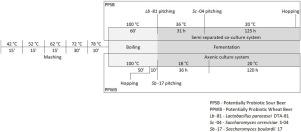当前位置:
X-MOL 学术
›
Food Bioprod. Process.
›
论文详情
Our official English website, www.x-mol.net, welcomes your feedback! (Note: you will need to create a separate account there.)
USE OF PROBIOTIC STRAINS TO PRODUCE BEERS BY AXENIC OR SEMI-SEPARATED CO-CULTURE SYSTEM
Food and Bioproducts Processing ( IF 4.6 ) Pub Date : 2020-11-01 , DOI: 10.1016/j.fbp.2020.10.001 L.C. Silva , G.B. Schmidt , L.G.O. Alves , V.S. Oliveira , R. Laureano-Melo , E. Stutz , J.F.P. Martins , B.P. Paula , R.H. Luchese , A.F Guerra , P. Rodrigues
Food and Bioproducts Processing ( IF 4.6 ) Pub Date : 2020-11-01 , DOI: 10.1016/j.fbp.2020.10.001 L.C. Silva , G.B. Schmidt , L.G.O. Alves , V.S. Oliveira , R. Laureano-Melo , E. Stutz , J.F.P. Martins , B.P. Paula , R.H. Luchese , A.F Guerra , P. Rodrigues

|
Abstract This study evaluated the production of beers to serve as matrices for probiotic delivery and designed suitable fermentation systems. Two types of beers (wheat and sour) were produced by fermentation in an axenic (Saccharomyces cerevisiae var boulardii 17) or semi-separated co-culture system (Lacticaseibacillus paracasei DTA-81 and Saccharomyces cerevisiae S-04). Firstly, trial was carried out to investigate microbial interactions between L. paracasei DTA-81 and Saccharomyces (n = 4) and to determine the best cultivation system to produce sour beer. S. boulardii17 potential to ferment the beer wort was similar to those observed for other brewer yeasts, enabling potentially probiotic wheat beer production. L. paracaseiDTA-81 was able to ferment the beer wort to produce potentially probiotic sour beer. However, the cultivation system should be carefully designed to protect the lacticaseibacilli from stressful metabolites produced during yeast fermentation, especially alcohol. Thus, data obtained herein showed that the co-culture system should be avoided for potentially probiotic sour beer production, in order to prevent competitive interaction between lacticaseibacilli and yeast. Otherwise, the semi-separated co-culture system resulted in a symbiotic commensal interaction, without interfering on L. paracasei DTA-81 growth and survivability. Therefore, wheat and sour beers can be highlighted as useful matrices to deliver probiotic strains.
中文翻译:

使用益生菌菌株通过无菌或半分离共培养系统生产啤酒
摘要 本研究评估了作为益生菌输送基质的啤酒的生产,并设计了合适的发酵系统。通过在无菌(酿酒酵母 var boulardii 17)或半分离共培养系统(Lacticaseibacillus paracasei DTA-81 和 Saccharomyces cerevisiae S-04)中发酵生产两种类型的啤酒(小麦和酸)。首先,进行了试验以研究副干酪乳杆菌 DTA-81 和酵母菌 (n = 4) 之间的微生物相互作用,并确定生产酸啤酒的最佳培养系统。S. boulardii17 发酵啤酒麦芽汁的潜力与观察到的其他啤酒酵母的潜力相似,能够生产潜在的益生菌小麦啤酒。L. paracaseiDTA-81 能够发酵啤酒麦芽汁以生产潜在的益生菌酸啤酒。然而,培养系统应精心设计,以保护乳酸杆菌免受酵母发酵过程中产生的压力代谢物,尤其是酒精的影响。因此,本文获得的数据表明,对于潜在的益生菌酸啤酒生产,应避免共培养系统,以防止乳酸杆菌和酵母之间的竞争性相互作用。否则,半分离的共培养系统会导致共生共生相互作用,而不会干扰副干酪乳杆菌 DTA-81 的生长和生存能力。因此,小麦和酸啤酒可以作为提供益生菌菌株的有用基质。此处获得的数据表明,为了防止乳酸杆菌和酵母之间的竞争性相互作用,应该避免共培养系统用于潜在的益生菌酸啤酒生产。否则,半分离的共培养系统会导致共生共生相互作用,而不会干扰副干酪乳杆菌 DTA-81 的生长和生存能力。因此,小麦和酸啤酒可以作为提供益生菌菌株的有用基质。此处获得的数据表明,为了防止乳酸杆菌和酵母之间的竞争性相互作用,应该避免共培养系统用于潜在的益生菌酸啤酒生产。否则,半分离的共培养系统会导致共生共生相互作用,而不会干扰副干酪乳杆菌 DTA-81 的生长和生存能力。因此,小麦和酸啤酒可以作为提供益生菌菌株的有用基质。
更新日期:2020-11-01
中文翻译:

使用益生菌菌株通过无菌或半分离共培养系统生产啤酒
摘要 本研究评估了作为益生菌输送基质的啤酒的生产,并设计了合适的发酵系统。通过在无菌(酿酒酵母 var boulardii 17)或半分离共培养系统(Lacticaseibacillus paracasei DTA-81 和 Saccharomyces cerevisiae S-04)中发酵生产两种类型的啤酒(小麦和酸)。首先,进行了试验以研究副干酪乳杆菌 DTA-81 和酵母菌 (n = 4) 之间的微生物相互作用,并确定生产酸啤酒的最佳培养系统。S. boulardii17 发酵啤酒麦芽汁的潜力与观察到的其他啤酒酵母的潜力相似,能够生产潜在的益生菌小麦啤酒。L. paracaseiDTA-81 能够发酵啤酒麦芽汁以生产潜在的益生菌酸啤酒。然而,培养系统应精心设计,以保护乳酸杆菌免受酵母发酵过程中产生的压力代谢物,尤其是酒精的影响。因此,本文获得的数据表明,对于潜在的益生菌酸啤酒生产,应避免共培养系统,以防止乳酸杆菌和酵母之间的竞争性相互作用。否则,半分离的共培养系统会导致共生共生相互作用,而不会干扰副干酪乳杆菌 DTA-81 的生长和生存能力。因此,小麦和酸啤酒可以作为提供益生菌菌株的有用基质。此处获得的数据表明,为了防止乳酸杆菌和酵母之间的竞争性相互作用,应该避免共培养系统用于潜在的益生菌酸啤酒生产。否则,半分离的共培养系统会导致共生共生相互作用,而不会干扰副干酪乳杆菌 DTA-81 的生长和生存能力。因此,小麦和酸啤酒可以作为提供益生菌菌株的有用基质。此处获得的数据表明,为了防止乳酸杆菌和酵母之间的竞争性相互作用,应该避免共培养系统用于潜在的益生菌酸啤酒生产。否则,半分离的共培养系统会导致共生共生相互作用,而不会干扰副干酪乳杆菌 DTA-81 的生长和生存能力。因此,小麦和酸啤酒可以作为提供益生菌菌株的有用基质。


























 京公网安备 11010802027423号
京公网安备 11010802027423号